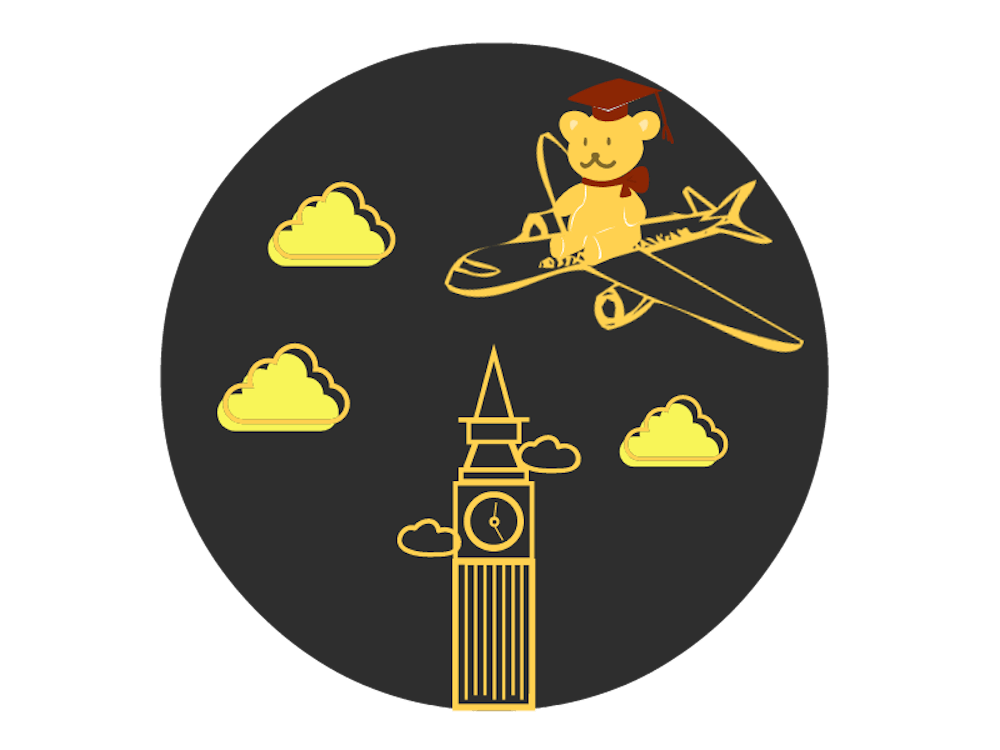I was trying to enjoy London, but I had a lot on my mind.
I trudged through the bustling streets of Camden to my flat, with only a newly created Spotify playlist keeping me company.
Volume increases — I stop to get Falafel. But stuck on my mind is one number: 58
That was the total number of people Stephen Paddock killed when he unleashed an unprecedented and unimaginable flurry of bullets on innocent people Oct. 1. Right now, it’s considered the worst mass shooting in America. I fear it won’t hold the title for long.
According to University of Sydney’s Gunpolicy.org project, 10,945 people were killed by guns in the United States in 2014. A huge, almost unimaginable number (Are 30 people seriously dying every day!?), but how does this compare to the U.K. statistic?
According to recent statistics from the House of Commons, from March 2015 to March 2016, the number of gun homicides in England and Wales was 26.
Twenty-six. In a population of nearly 60 million people.
Getting a firearm in the United Kingdom is very difficult. In fact, you need to get a certificate, and it’s a pretty long process (you need references of good character, seriously). Unlike in the United States, you also need to demonstrate you have a legitimate use for the gun, such as in your line of work or as a hunter.
But still, we had double what they had in a year in just one horrific incident? Even given that the U.S. has a far larger population, those numbers are hard to swallow.
But one thing I have noticed about London is how safe it always feels; it’s easily one of the best qualities of this lovely city. I could be walking around at two in the morning, and I’ll still feel safer than I ever do in Boston or Phoenix.
While in Phoenix you could see a man brandishing a firearm if you ride the light rail from downtown to Tempe enough times, here the police don’t even have guns. In fact, during the period I mentioned earlier, police only fired a gun on seven occasions.
Often times in the U.S., the type of gun reform that many want is immediately torpedoed with help by the National Rifle Association (NRA), most notably the Assault Weapon Ban of 2013, which would have heavily regulated the sale of a number of firearms in the United States. I remembered the NRA and what they had done and I wondered: was there an equivalent in the U.K? How could there ever be with such stringent guns laws?
Turns out, there is a U.K. equivalent. In fact, they are called the National Rifle Association of the United Kingdom (AKA the NRA). But the similarities stop at the acronym and the mutual love of firearms, as I can tell as I speak to NRA CEO Andrew Mercer.
Mercer tells me about the NRA’s range in Bisley, boasting that it’s the largest gun range in Europe, and that ages of members ranged from 14 all the way to 94.
Mercer says the UK’s NRA advocates for legislative actions that benefit gun users and clubs, such as making owning guns a simpler process with less paperwork and keeping .50 caliber weapons legal, among other issues.
Mercer loves and advocates for shooting for sport, but what about an individual right to bear arms in a country where it is far more of a privilege?
His ambivalent answer surprised me, even in a far more restrained gun culture.
“I don’t know much about the pros and cons,” Mercer said.
Mercer said even if his organization did want to advocate for an individual right to bear arms, it would be impossible to create meaningful change given the feelings of the U.K.’s population.
“We recognize this is a small, congested island, and the culture here isn’t to use guns (for non-sporting purposes),” Mercer said. “That’s not recognized by the U.K. government. They’re for sporting.”
There are a lot of similarities I’ve found between the U.S. and the U.K.: the cold brew, Tinder dates, Chipotle, the high-priced fidget spinners ravaging the corners of our cities, etc.
But the way they handle guns here may be the biggest culture shock I’ve seen yet.
Almost nobody has guns, whether political militants, police officers, or strange men on public transportation.
It makes sense for authorities to have a monopoly of force over the population; otherwise, they wouldn’t even really be authorities.
But every time I see a cop here with nothing but a nightstick I think: What if the cop who shot Philando Castile only had a nightstick? What about Tamir Rice’s assailant? Daniel Shaver? What if these confrontations caused bruises instead of funerals?
I think it might be time in the U.S. to look at different options when it comes to the weaponization of our police forces. I think the U.S. would be a whole lot safer with everyone having less guns. Maybe I could hear a loud noise in public and not fear that it’s some maniac with an AK. And if you don’t believe me, fly to London and experience the difference.
Reach the blogger at David.J.Marino@asu.edu or follow @Marinodavidjr on Twitter.
Editor’s note: The opinions presented in this blog are the author’s and do not imply any endorsement from The State Press or its editors.
Like The State Press on Facebook and follow @statepress on Twitter




